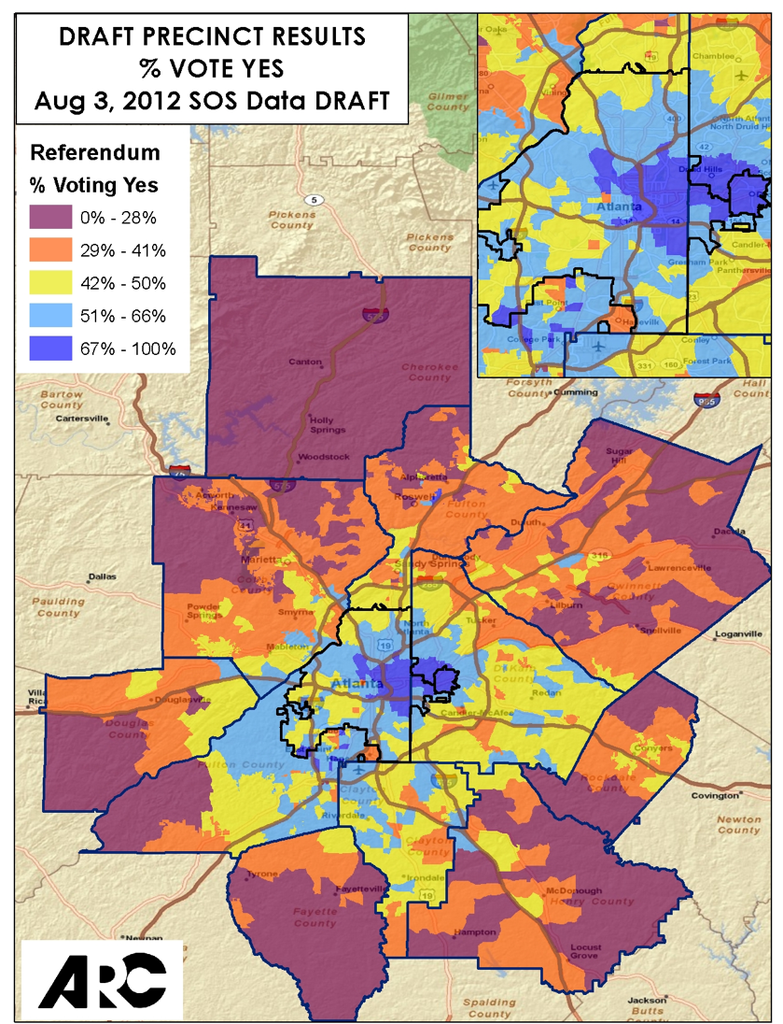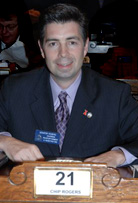Inaccurate labelling is the reason T-SPLOST was defeated,
along with Atlanta is not all of Georgia,
but the Wall Street Journal doesn’t understand that.
Cameron McWhirter wrote for the Wall Street Journal 1 August 2012,
Tea Party Ties Up Tax to Ease Atlanta Traffic
ATLANTA—Money and heavyweight endorsements don’t secure an
election — especially when you propose higher taxes in a
deeply conservative state with a robust tea-party movement.
A plan for a transportation sales tax was endorsed by Georgia’s
Republican governor and the Democratic mayor of the state’s largest
city. It was backed by the Metro Atlanta Chamber of Commerce and the
area’s top businesses. It was pushed by top political consultants
funded by more than $8 million in corporate and other donations.
Those against the plan were a loose coalition of tea-party
activists, some environmentalists and a local branch of the NAACP.
Their total raised? About $15,000.
But David slew Goliath.
That’s lazy reporting.
Those “some environmentalists” included the
Georgia Sierra Club,
an organization which reportedly has
more members than the state Democratic Party.
And that’s just in Atlanta.
 Opponents in our region included
Democrat Ashley Paulk,
who was on the T-SPLOST executive committee
and is the current Chairman of the Lowndes County Commission,
Democrat Gretchen Quarterman,
who is the Chairman of the Lowndes County Democratic Party (LCDP)
and
is running for Chairman of the Lowndes County Commission,
as well as
Nolen Cox, Chairman of the Lowndes County Republican Party (LCRP),
and Roy Taylor,
LRCP First Vice Chair and well-known Tea Party activist,
along with a wide range of other opponents.
Opponents in our region included
Democrat Ashley Paulk,
who was on the T-SPLOST executive committee
and is the current Chairman of the Lowndes County Commission,
Democrat Gretchen Quarterman,
who is the Chairman of the Lowndes County Democratic Party (LCDP)
and
is running for Chairman of the Lowndes County Commission,
as well as
Nolen Cox, Chairman of the Lowndes County Republican Party (LCRP),
and Roy Taylor,
LRCP First Vice Chair and well-known Tea Party activist,
along with a wide range of other opponents.
 Look at the difference between that Region 11 T-SPLOST vote map and this map of
the Atlanta Metro T-SPLOST vote.
Atlanta metro is clearly centered around Atlanta.
Region 11 isn’t an economic region:
the vote was split right down the middle between No on the east and west
and Yes in between.
Look at the difference between that Region 11 T-SPLOST vote map and this map of
the Atlanta Metro T-SPLOST vote.
Atlanta metro is clearly centered around Atlanta.
Region 11 isn’t an economic region:
the vote was split right down the middle between No on the east and west
and Yes in between.
Region 11 throws together three population centers:
Lowndes, Tift, and Ware Counties, with their largest cities Valdosta,
Tifton, and Waycross.
Lowndes and Tift are at least connected by I-75, and they and most
of the ones around them voted against
(Ben Hill, Turner, Berrien, Cook, Lanier, Echols, and Brooks).
Ware County and all the counties east of it (Pierce, Brantley, and Charlton)
voted against.
In between there’s a complete barrier of counties that voted for T-SPLOST
(Irwin, Coffee, Bacon, Atkinson, and Clinch).
Those No counties completely separate the eastern Ware County group
from the western Lowndes-Tift group.
The perception around here is that T-SPLOST was made up to affect
metro Atlanta, and the rest of the regions were
Continue reading →
The Valdosta-Lowndes County Industrial Authority plans to send a petition to Lowndes County Superior Court to sue Wiregrass Power, LLC, for a clear title on the land purchased for the development of a biomass energy plant.












 for
for 







